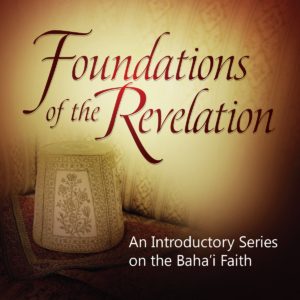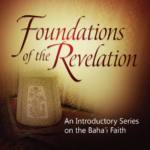
As the Editor of Sifter of Dust, I thought it valuable to put together an audio-summary of the major Baha’i Writings referred to in our posts and podcast. The Foundations of the Revelation Series is my core introduction to the Baha’i Faith starting from scratch. The first several presentations will introduce the Bahá’í Faith generally, with each presentation viewing it from a different perspective. These “prequel” presentations are followed by a more structured survey of the major Baha’i texts in the context of their Revelation, both historically and conceptually. All the presentations heavily draw on the Bahá’í sacred texts themselves.
This course is a reflection of my own study and personal understanding and is intended only to provide a helpful starting point to your own exploration. The goal is to provide introductory context to the texts.
Below you will find each of the presentations and discussions in order, available for download after they are delivered. If title is red, presentation has been posted.

1. “What!? A new Revelation?"- An Introduction to the Baha’i Faith
What is the nature of religion and claims to divine revelation? Are they relics of bygone ages or the source of values for the renewal of our planet? How can we understand religion in a way that is unifying and progressive? This presentation will highlight the concept of “progressive revelation” revealed by Baha’u’llah and use that as a lens to understand the Baha’i Faith itself. Though “revelation” is increasingly viewed with skepticism by our modern world, we will discuss the impact of previous “revelations” on the growth of civilization and highlight how its impact remains ever present. We will also highlight the incredible significance of Baha’u’llah’s claim to divine revelation, and how the intellectual and moral integrity of that claim should challenge us to rethink the nature and truth of divine revelation as a phenomenon.

2. “How to spread your religion”- An Introduction to the Baha’i Faith
How do you spread a religion that is based on unity and seeks to bring the whole world together? Most religions of the past were spread by empires conquering other empires, but you can’t build a world community based on the unity and dignity of all human beings with a sword. This presentation will describe the manner in which Baha’u’llah stated His revelation must unfold in the world, through the power of “truth and understanding” and the absence of any form of conflict or contention with others. It will also describe the nature of the modern day world Baha’i community - the most diverse community of people on the planet - and the constructive grassroots processes they are engaged in to improve their local communities.

3. "An Introduction to the Phenomenon of Divine Revelation"
Jesus and Muhammad both claimed "divine revelation" and their teachings had an enormous impact on civilization and human progress. The both also built their teachings on older religions that similarly claimed to be "divine revelations". Though the modern world is skeptical about the truth of such claims, the explanations and understanding we obtain from studying Baha'u'llah's revelation allow us to see divine revelation in an entirely new light- as a natural part of our world, organic with human capacity and civilization, and the greatest proof of God's concern for us. This presentation is a prelude to the study of of God's latest revelation to all humanity, and will introduce the Foundations of the Revelation course.

4. “The Prophet of Shiraz”- An Introduction to the Báb and His Teachings
In the middle of the 19th century, when European intellectuals were questioning the basis of belief in religion, a young merchant from Shiraz, Persia arose to start a movement that would evolve into a modern world religion. He named himself “ the Báb” (“the Gate”, in Arabic) and His revelation answered many of the most critical questions underlying the European intellectual challenges, reframing them in a completely new and dynamic context. This presentation will tell the story of the Báb and review His revolutionary theology, a theology that transforms how we have traditionally thought about religion. Would Nietzsche - born the same year the Báb declared his mission - have written that God was dead if he knew about the Prophet of Shiraz?

5. “Him Whom God Shall Make Manifest”- Introducing Baha’u’llah
After the Prophet of Shiraz raised His call and laid out His theology, He promised that another would come soon after to bring a revelation to fulfill all that He had taught. He referred to this figure as “Him Whom God Shall Make Manifest”, and sacrificed His life and many of his followers to prepare the path for Him. That figure was Baha’u’llah, who would then proclaim a religion whose principles are now the focus of human hope all over the world. This presentation will introduce the early life of Baha’u’llah and the beginning of His Revelation, setting the stages for the life of persecution and exile He would then endure.

6. “Noble have I created Thee”- An Introduction to Baha’u’llah’s “Hidden Words"
One of Baha’u’llah’s first significant revelations was a series of short statements spoken with the Voice of God directly to the human heart, known as the “Hidden Words”. Hailed as the “inner essence” of all previous Revelations, it is an astounding and transformative work that inspires hearts all over the world on a daily basis. It is God’s voice in its most naked form, speaking to the truest part of each human soul. This presentation will attempt to introduce this incredibly majestic and important work.

7. “An Eye to Past Ages and Centuries”- An Introduction to the Book of Certitude
Confused by how his own nephew could have been the messiah of his religion, the uncle of the Báb addressed Baha’u’llah several theological questions. In reply, and in a period of only 48 hours, Baha’u’llah revealed the “Book of Certitude”- also known as the Kitab-Iqan. This remarkable work answers the traditional theological questions of all Semitic religions and lays the groundwork for their ultimate unity. In clear and flowing language, Baha’u’llah expands on the major theme of the Báb - the progressive revelation of religious truth - and addresses many of the stumbling blocks people have had in accepting a new revelation. Baha’i’s regard it as the fulfillment of Christ’s promise that He would one day return and “speak plainly of the Father”.

8. “But what about me?..The Human Soul’s Mystical Journey “
Eastern religions have traditionally focused on the inner spiritual and mystical path. This perspective evolved within Islam as the mystical and philosophical school known as Sufism, to the followers of which Baha’u’llah addressed several soul stirring and beautiful Tablets. A review of these Tablets opens you up to a new perspective on life, one in which you see your life and inner world as a spiritual journey to your higher self. Philosophically, Baha’u’llah also unites many of the themes of traditional eastern religions like Hinduism and Buddhism, with the Semitic religions of Judaism, Christianity, and Islam. We will also explore the principles Baha’u’llah laid down for being a “true seeker” after truth.

9. “The Prisoner and the Kings"- An Introduction to Baha’u’llah’s Tablets to the Kings
In 1863, in a small garden outside of Baghdad, the truth of Baha’u’llah’s revelation was finally made public to the world, followed shortly by proclamatory Tablets revealed by His Pen to all the significant kings and ecclesiastical rulers of the world at that time. These majestic and powerful Tablets, spoken with the Voice of God, are unparalleled in the religious history of humankind. In them, He stands up for every oppressed one, rebukes the prideful leaders who had no regard for the people, and begins to lay down the foundational principles for a united world.

10. “The Pen of the Most High and the Building of a New Community”
Baha’u’llah stated that He would “build the world anew” with the power of his own “Pen”. The “Pen” was a metaphor for the voice of Divine revelation and the Word of God that it formed. Tablets that Baha’u’llah revealed were carried on foot by his followers over hundreds of miles to small communities scattered about the Middle East, where they would be copied, shared, and ultimately cherished by a persecuted community who took great risks just to have them in their possession. From these humble beginnings, His message has now spread all over the world. This presentation will focus on the nature of the Word of God itself and its transformative character upon real life communities. We will highlight some poignant and touching Tablets to individuals and communities that struggled under severe persecution and hardship.

11. “Life, the Universe, and Everything- A New View of Science and Religion”
The last 100 years of scientific investigation has taught us that we are only a small part of an almost inconceivably large universe that is truly ancient. The reality of that has challenged our perception of ourselves as living lives that are ultimately meaningful. This presentation will highlight Baha’u’llah’s expanded vision of creation itself, how it accepts the grandness of the universe while still preserving the significance of human life within it. Such a vision lays the groundwork for the worldviews of both science and religion to be accommodated within our human consciousness. We will also explore the emphasis in Baha’u’llah’s revelation on “fair-mindedness”, “justice”, and a commitment to rational thought.

12. “Life after Death- Insights from the New Revelation”
Christ taught that God’s “mansion” had “many rooms”. The Quran consistently emphasizes living one’s life with a view towards the “life to come”. In the Revelation of Baha’u’llah, humanity is given more insight into the life after this one than any other previous revelation. What is the nature of life after death? What is the nature of the human soul? This presentation will share the insights in the Baha’i writings on the nature of life after death and present some rational ways we can think about the nature of the human soul.

13. “Consultation and Compassion- the New Tools of Modern Decision making”
If we are to build a truly peaceful world, we need new ways to collectively solve problems. Baha’u’llah’s teachings emphasize a consultative and non-authoritative approach to truth, one that puts facts and evidence at the center of our thinking and encourages people to work consultatively and collaboratively to solve problems. Principles such as justice, a spirit of service, the oneness of humanity, and equity should further inform all decision-making processes. As opposed to ego-driven processes that ultimately benefit a portion of people at the expense of others, consultative decision making processes that are informed by the highest spiritual and moral principles bring unity and create the best opportunity for everyone to mutually benefit. This presentation will explore these themes as they are expressed in the Baha’i Writings.

14. “Unveiling the Choice Wine"- An Introduction to Baha’u’llah’s Book of Laws
After spiritualizing the community of His followers, Baha’u’llah revealed his Book of Laws - known as the Kitab-i-Aqdas. In this presentation, we will review how Baha’u’llah characterized his laws as not a “mere code of laws” but the “choice wine revealed by the Fingers of might and power”. Laws and standards are not seen as restrictions, but the “breath of life” that protect and support humanity’s spiritual path. We will review some of Baha’u’llah’s laws, which represent the highest standard of human behavior the world has ever known. We will also highlight some of the relationships between Baha’i laws and the laws of civil society, which have complementary but different aims and purposes.

15. “The Epistle to the Son of the Wolf- Baha’u’llah’s Summary of His Message”
In His last significant work, Baha’u’llah revealed a long Tablet to a cleric known as the “Son of the Wolf” who was infamous for his generally illicit activities and persecution of Baha’u’llah’s followers. In this remarkable work, Baha’u’llah re-reveals many previous passages and summarizes His Revelation for all humanity.

16. “`Abdu'l-Bahá - An Example to all Humankind”
Baha’u’llah passed away in 1892 in the Holy Land, leaving behind a vast spiritual heritage of Tablets and Writings that will sustain humanity for centuries. He also left humanity his own son - `Abdu'l-Bahá - as the exemplar of his teachings and the Center of His Covenant. Baha’u’llah referred to him as “The Master” but `Abdu'l-Bahá referred to himself as the “The Servant”, changing his given name “Abbas” to the title `Abdu'l-Bahá (“servant of Baha”). This lecture presents the remarkable figure of `Abdu'l-Bahá, one of the most beloved human beings to ever live, and also one of humanity’s clearest thinkers and educators.

17. “The Promulgation of Universal Peace- `Abdu'l-Bahá ‘s speeches in America and Europe”
In 1912, `Abdu'l-Bahá traveled to the US and Europe and spoke to public gatherings in dozens of locations. To a racially divided America, he proclaimed the unity of the races, and put African-Americans at the grandest seat at the table while insisting on fully integrated gatherings. He further began to fully unveil Baha’u’llah’s teaching of the equality of men and women and the implications of that reality on our social structures. In all he did and said, he demonstrated his Father’s message and taught people how to “walk the spiritual path with practical feet”. His talks remain as fresh and urgent today as they were when they were delivered over a hundred years ago. This lecture will introduce the talks and writings of `Abdu'l-Bahá and inspire the reading of these wonderful presentations of truth.

18. “The Guardian of the Baha’i Faith- An Introduction to the Life and Works of Shoghi Effendi”
Upon `Abdu'l-Bahá ‘s passing in 1921, he appointed his grandson as the center of the Baha’i Faith. Only 25 years of age and a student at Oxford, the young Shoghi Effendi began to shoulder the burdens of leadership of a new world religion. Under his leadership, Baha’u’llah’s faith spread over the world and remarkable translations of the sacred texts were made available in English for all Baha’is. Over 36 years, Shoghi Effendi typed out over 30,000 letters to the world-wide Baha’i community, all on a small typewriter with two fingers and little administrative support. His letters to the Baha’i world, outlining the implications of Baha’u’llah’s revelation and the unfoldment of his “World Order”, are inspiring reading for all humanity. This presentation will introduce some of the more significant texts and passages from Shoghi Effendi.

19. “The sweetness of rest within.. His vast and mighty Revelation”- Summary Lecture
Baha’u’llah taught that the primary purpose of all religion, and indeed of all life, is fundamentally for the education of the human spirit. Taking the perspective that all religion is for our learning and development, and that all of humanity is in one big school for spiritual and material education, creates a perspective that is both clarifying and unifying. This, the final presentation of the series, will highlight this perspective as it is spelled out throughout the Baha’i Writings, and use it as the context for encouraging everyone’s further exploration of this astonishingly beautiful religion.